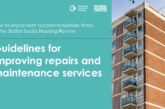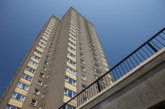
The major new ‘fitness for human habitation’ legislation, set to come into force next month, could prove a financial headache for many of the UK’s housing associations, warns legal housing specialist Clarke Willmott LLP.
Danny Dedman, Associate in the firm’s housing management team, says the main challenge will be that registered providers and their tenants will have to come to a mutual understanding when it comes to the definition of a particular complaint.
“The new law means housing associations and their tenants will have to agree on what is ‘reasonably suitable’ for occupation between themselves in the event of any dissatisfaction, or face the prospect of potentially expensive and lengthy court proceedings.
“With no free and independent body to adjudicate, there is likely to be disagreement between landlords and tenants as inevitably each will have their own idea of what is reasonably suitable for ‘human habitation’.”
Danny believes a knock-on effect of the increase in required repairs will also affect capacity, budgets and contract tenders, and that many repairs teams will need to adapt to deal with the subsequent increase in the volume of requested works.
“We will no doubt see an increase in the number of litigants in person as it will become easier to bring cases for disrepair which are less technical in nature and involve defects which may have previously been considered to be improvements.
“Since damages have always been a discretionary remedy, there is unlikely to be a change in the way damages are calculated for any breaches of the Act, although no doubt precedents will emerge as cases are resolved in the next few years.”
Clarke Willmott has been encouraging its clients to adopt the new legislation as soon possible and is offering free training on the new measures and advice on existing disrepair policies and tenancy standards. The firm’s specialist social housing team represents over 100 registered providers and is one of the largest in the UK.









